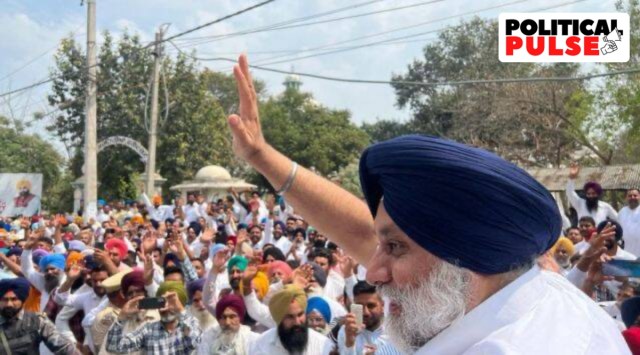As Amritpal manhunt continues, Akalis make a play for Panthic support, try to regain lost ground
The Shiromani Akali Dal has announced legal assistance for those detained by the police as they looked for the Sikh preacher who is still on the run.
 SAD president Sukhbir Singh Badal after coming out of Faridkot court in Kotkapura firing case. (Express photo)
SAD president Sukhbir Singh Badal after coming out of Faridkot court in Kotkapura firing case. (Express photo)Beset by electoral setbacks and legal troubles, the police crackdown in Punjab in the wake of the Amritpal Singh episode has provided the Shiromani Akali Dal (SAD) and the Badals an opportunity to regain its lost ground in Panthic politics, something that had made the party a strong political force starting in the 1990s.
The SAD has been pushed to the margins of state politics since the debacles in the Assembly elections in 2017 and last year, with its tally plummeting to a record low of three constituencies. The party’s decline, in part, is a result of the erosion of its Panthic vote base that occurred because of the way it handled the sacrilege cases.
The third incident of sacrilege on October 12, 2015, led to massive protests followed by heavy-handed police action that has remained a political issue in the state ever since. Police firing that day in Kotkapura alone left around 60 people injured, including over 30 police officials. The Badals, who were in power at the time, are still dealing with the legal fallout of the case. On March 16, a court in Faridkot declined the anticipatory bail plea of former Deputy Chief Minister Sukhbir Singh Badal but granted it to his father and former CM Parkash Singh Badal. Sukhbir then secured interim bail from the Punjab and Haryana High Court on March 22.
Amid these troubles for the SAD, came the police crackdown and manhunt for Sikh preacher and Khalistan sympathiser Amritpal Singh. The police detained more than 200 people, but have started releasing some of them. On Friday, the police released 44 youngsters held under preventive detention and handed them over to their families. This came a day after Punjab Inspector General of Police (Headquarters) Sukhchain Singh Gill announced that 177 of the 207 people detained would be let off with a warning and action would be taken against 30 involved in “substantive criminal activities”.
But the police action has drawn criticism from the SAD, which announced earlier this week that it would set up a legal cell to help the young men arrested by the police and those charged under the National Security Act (NSA). Former Akali Dal MLA Harinderpal Singh Chandumajra told The Indian Express on Saturday, “The party decided to help young, innocent youth after discussions among the senior leaders that Akali Dal, being the regional party representing the Sikh community, should come forward at his juncture where the youth in their early twenties were detained without any reason. Apart from the Sikh community, the issue also concerns human rights and freedom of speech and expression.”
On Tuesday, announcing the move to provide legal help for the youths arrested Sukhbir Singh Badal said, “It is shocking that scores of youth are being arrested indiscriminately merely on suspicion.”
“Many Sikh youths are being implicated in fake cases,” Akali Dal MLA Manpreet Singh Ayali said in the Assembly on Wednesday. “Over the years Punjab has gone through tough times. Sikhs in Punjab are being made to feel like slaves by invocation of the NSA.” Ayali’s party colleague Virsa Singh Valtoha has said the Amritpal episode is “an ordinary law-and-order situation” and condemned the use of the NSA.
On Thursday, Parkash Singh Badal expressed concern over the “sequence of recent events in Punjab” and called for “an end to the ongoing wave of repression against innocents”. He also called for “maximum vigil” to preserve the hard-earned atmosphere of peace and communal harmony in the state. “This is a critical hour and it calls for an exercise of optimum restraint, sagacity and far-sightedness by those in power,” said Badal.
Course correction
The SAD’s statements and actions in the wake of the Amritpal episode illustrate its attempts to re-establish itself as the pre-eminent political party representing the interests of the Sikh community. But these actions have not come about in a vacuum but are part of a strategy the party adopted following a review conducted last year after its poll debacle. Among other recommendations, the review committee suggested a course correction and an overhaul in the functioning of the party to win back Panthic support.
In November, Sukhbir attended the wedding of the grandson of Khalistani militant Jarnail Singh Bhindranwale, who was killed in the Golden Temple in the Army’s Operation Bluestar in 1984. Then, in the first week of January, Sukhbir attended two events within days that signalled a shift in the party’s strategy. On January 1, the former Deputy CM visited the house of Satwant Singh, one of Indira Gandhi’s assassins, in Gurdaspur district’s Agwan village and also went to a local gurdwara constructed in Singh’s memory. Five days later, Sukhbir became the first Akali Dal president to visit the Golden Temple on January 6, which is the death anniversary of Satwant and another of Indira’s assassins, Kehar Singh.
Professor Jagrup Singh Sekhon, a former head of the Department of Political Science at Guru Nanak Dev University, is sceptical about the political mileage the Akali Dal can derive from offering legal assistance to the arrested Sikh youth.
“The Akali leadership has lost political sense. First, they condemned Amritpal on the Ajnala incident, then they initially kept mum after the police crackdown and later announced the offer of legal assistance to the arrested men. The Akali leadership appears to be cut off from the grassroots realities. Everyone is against the idea of Khalistan. The villagers who were the main support base of the Akali Dal were the ones who suffered the most during the days of militancy and terrorism. The (AAP-led state) government has said it will release 177 of the 207 detained and will proceed legally against 30 hardcore criminals. Who will the Akali Dal help? The ones involved in heinous crimes?”



- 01
- 02
- 03
- 04
- 05




























